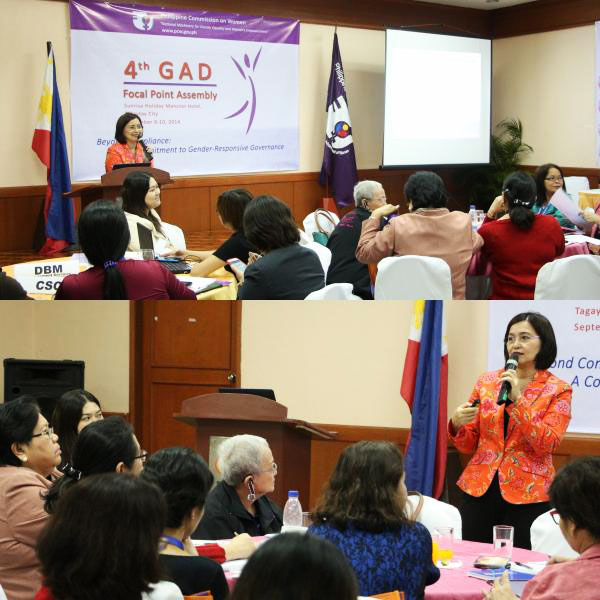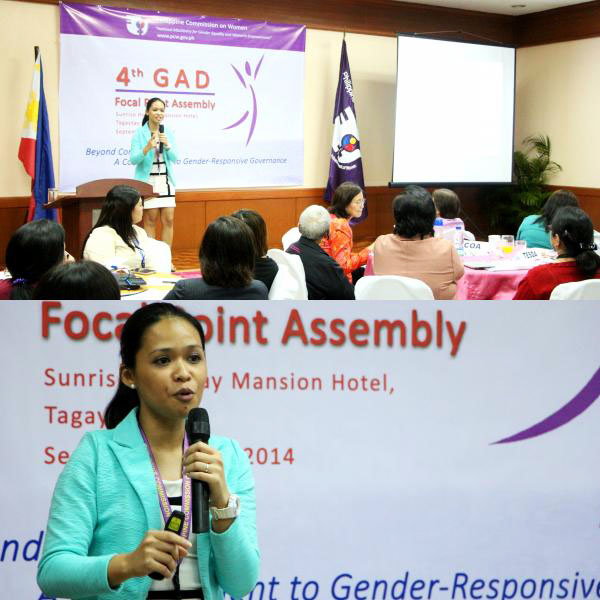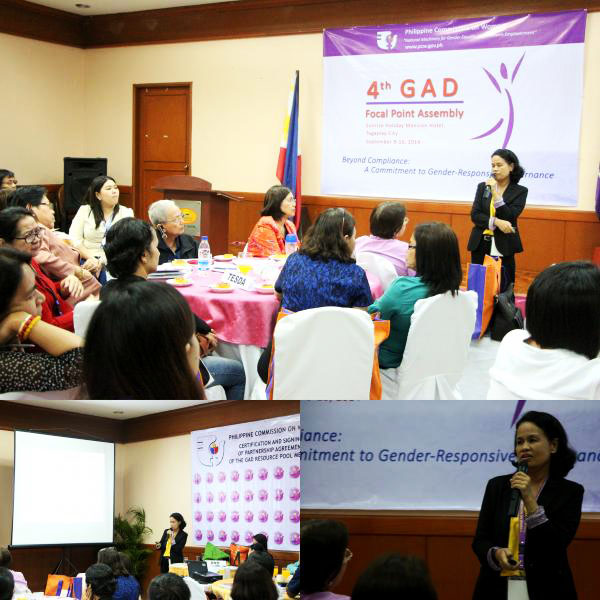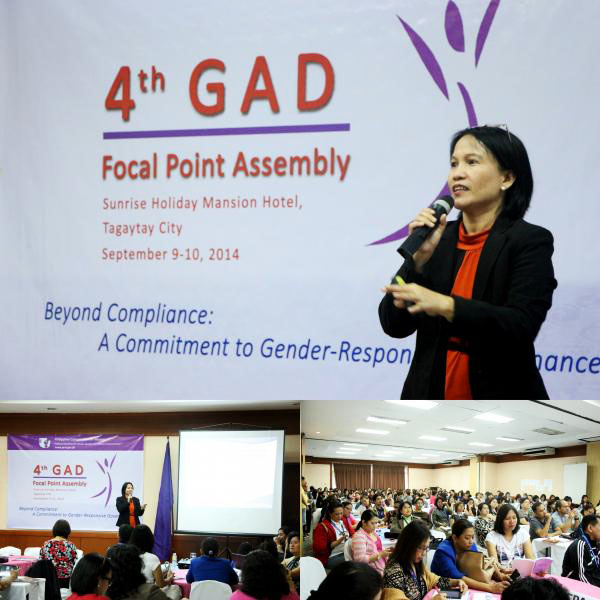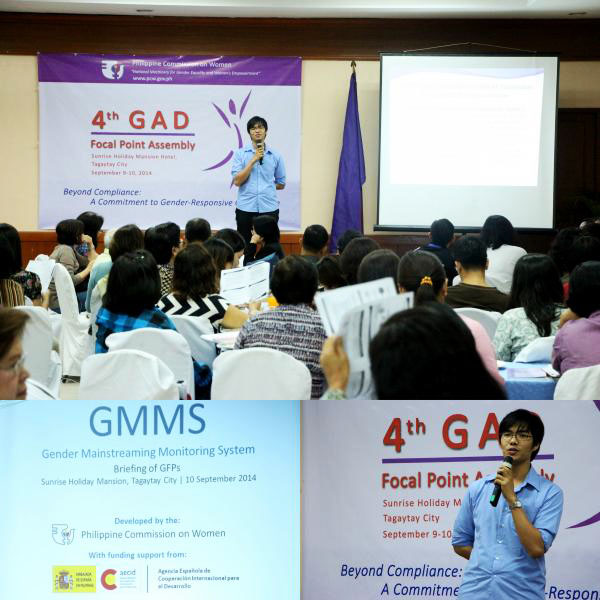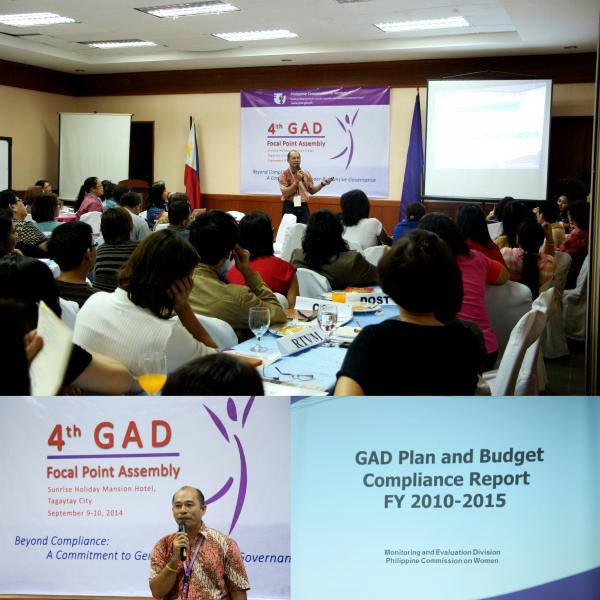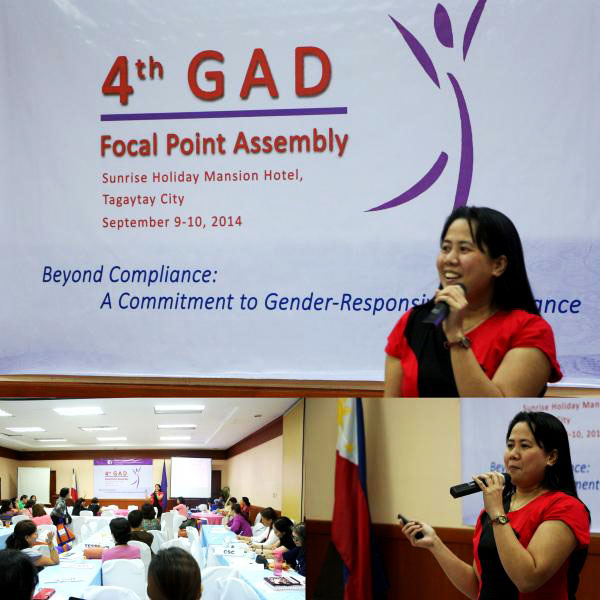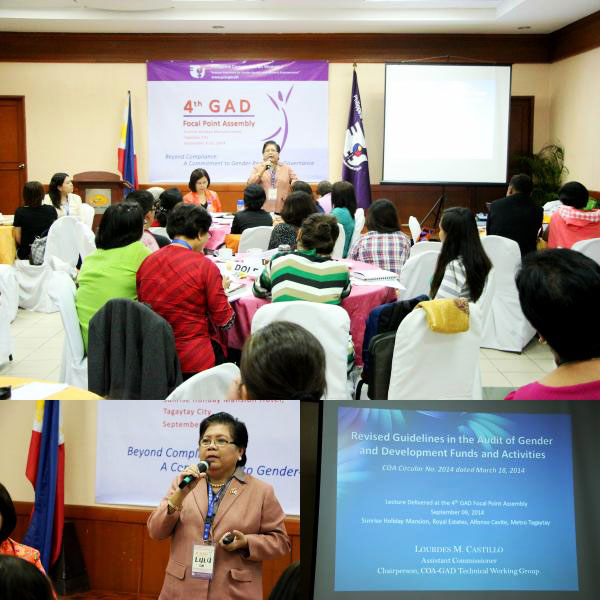PCW encourages government agencies to move beyond compliance towards gender-responsive governance
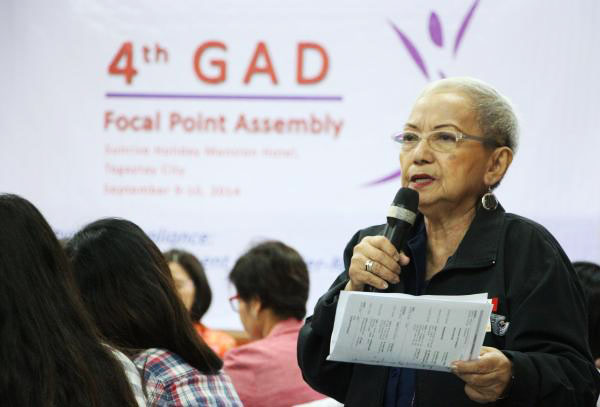
The Philippine Commission on Women conducted its 4th Gender and Development Focal Point (GFP) Assembly with the theme “Beyond Compliance; A Commitment to Gender-Responsive Governance” on September 9-10, 2014 at Sunrise Holiday Mansion, Tagaytay City.
Said assembly, which was attended by around 220 GAD Focal Point System (GFPS) members of 77 government agencies, aims to inform GFPS members on latest GAD related issuances and identify ways to strengthen their capacities as catalysts for gender mainstreaming in the bureaucracy.
“GFPS is not the same for all agencies; some have been there for quite some time while others are still in the inception stage. This gathering of GFPS members will hopefully help out those struggling to make gender mainstreaming (GM) work in their organization.” said PCW Chairperson Remedios Rikken in her welcome remarks.
Beyond compliance
The creation of Focal Point for women’s concerns started when the late President Corazon Aquino issued an Executive Order 348 mandating all government agencies to implement the 1st Philippine Development Plan for Women for 1989 to 1992.
As a member state to the various international and human rights treaties and with the enactment of women-related laws (Women in Nation and Building Act of 1992 and Magna Carta of Women of 2009) the institutionalization of the GFPS in all government agencies was further strengthened.
To operationalize the GFPS, PCW issued Memorandum Circular 2011-01 or the Guidelines for the Creation, Strengthening and Institutionalization of the GAD Focal Point System last 2011.
These guidelines clarifies the roles and responsibilities, composition and structure of the GFPS to enable it to function as a mechanism for catalyzing and accelerating gender mainstreaming in the agency towards the promotion of gender equality and women’s empowerment.
“We want to see whether GAD mainstreaming actually works. We want to see that we are not just here complying for these international and local mandates but we would like to make us all believe that this is an imperative, this is something important for us in the bureaucracy to champion, because half of the population are affected by policies, programs and projects that continue to discriminate women and prevent them from being empowered and advancing,” said PCW Executive Director Emmeline Verzosa.
“We expect GFPS to accelerate the process and sustain efforts in gender mainstreaming and benchmark good practices on GAD,” Verzosa added
PCW Executive Director further emphasized on convergence – that concerted efforts of government agencies is imperative to generate better outcomes.
“We cannot do our own programs on our own. If we want to address the needs of our clients and beneficiaries at the community level for women’s economic empowerment, economic agencies must be working together to address the needs,” said Verzosa.
Notable GAD mainstreaming practices
Bronze recipients of the first GADtimpala awards, Department of Social Welfare and Development (DSWD) and Technical Educational and Skills Development Authority (TESDA) shared their notable practices and experiences on gender mainstreaming
Chief Technical Education and Skills Development Specialist and Center Administrator of TESDA Women’s Center, Ms. Maria Clara Ignacio, said that TESDA’s journey in gender mainstreaming had not always been smooth sailing.
“Yung mga challenges po namin, isa lang po dun yung getting the executive offices and other units in TESDA to mainstream GAD in their regular programs, activities and projects (PAPs). This was not easy at the onset kasi may TESDA Women’s Center (TWC), there was a tendency na ma-marginalized yung GAD function within the TWC lang. Parang laging sinasabi ng executive offices sa central, bahala na ang TWC pagdating sa GAD programs at saka sa women’s concerns. This is not the concern of TWC lang but this is the concern of all the operating units. Hindi pa nila na-aappreciate na maintegrate sa regular programs. The utilization of the 5% GAD budget was always been a source of confusion to all regional and executive offices and meron ding difficulty to utilize, parang ang hirap hirap gamitin ng 5% kasi ang laki ng budget ng TESDA,” said Ignacio.
But with advocacy, constant dialogue, reminders during cluster meetings, capacity developments and issuance of strategic policies, TESDA were able to overcome the said challenges in pushing gender-responsive programs.
“We are proud to say that our 2014 GAD Plan and Budget (GPB), inabot talaga namin ang 5%,” she added.
Ms. Norilyn Rivera of the DSWD GAD-Secretariat shared their agency’s GAD mainstreaming guidelines.
“DSWD is among the first national government agencies (NGAs) to have developed its own GAD mainstreaming guidelines and framework. It is in these guidelines that gender mainstreaming should present in all processes in the delivery of social protection programs and services – allowing opportunities for both men and women” Rivera,” said.
Revised audit guidelines of GAD Funds
Commission on Audit (COA) Assistant Commissioner Lourdes M. Castillo discussed the revised guidelines in the audit of GAD funds and activities in government agencies. Last March 18, 2014, COA issued Circular 2014-001 providing a more comprehensive and detailed guidelines.
“We are only auditing what you have done and what you have done is what we are going to see. And what we have seen, that’s what we are going to report,” Asst. Commissioner Castillo said.
She encouraged all government agencies to invite COA auditors during their GAD Planning and Budgeting workshop because they are the ones who will see and audit the programs that they will be implementing. She also emphasized that COA will strictly audit GAD funds of PCW endorsed GPB’s of government agencies.
The two-day assembly oriented GFPS members on the preparation of annual GAD plans and budgets, Women’s Empowerment, Development and Gender Equality (Women’s EDGE Plan 2013-2016), Magna Carta of Women (MCW) baseline process and initial data, Gender Mainstreaming Monitoring System (GMMS) and project on Enhancing Policy Making Through Information Technology: Crowdsourcing of Comments on Women’s Legislative Agenda.
The GFPS Assembly is organized by the PCW to provide venue to all GFPS members to share updates, lessons and good practices in mainstreaming GAD in the bureaucracy.

